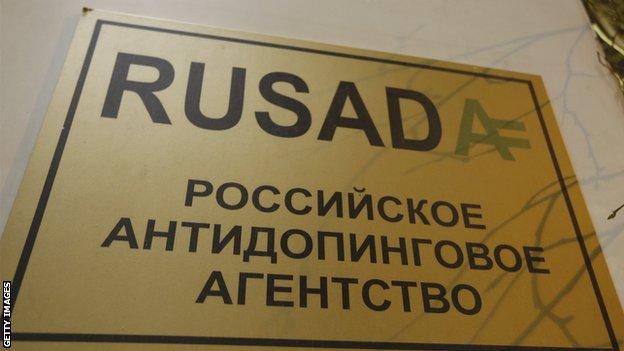Russian doping: Rusada on verge of suspension again
Last updated on .From the section Sport

Russia's anti-doping agency (Rusada) is again on the verge of suspension after a World Anti-Doping Agency (Wada) inspection team was denied full access to a Moscow anti-doping laboratory.
Wada lifted a three-year ban on Rusada in September which followed a major scandal over state-sponsored doping.
Access to the Moscow laboratory data and samples before the end of 2018 was a condition of Russia's reinstatement.
"The team was unable to complete its mission," Wada said.
"An issue was raised by the Russian authorities that the team's equipment to be used for the data extraction was required to be certified under Russian law.
"This issue had not been raised during an initial meeting on 28 November in Moscow, after which Wada sent its expert team back to Moscow to retrieve the data."
Wada said a report will now be sent to the independent Compliance Review Committee (CRC). The CRC will meet on 14-15 January 2019 when Rusada's "compliance status" will again be considered.
The CRC's recommendation will then be considered by the Wada executive committee.
"Surprise, surprise - is anyone shocked that the Russians are bobbing and weaving to escape accountability? Let's hope Wada has learned its lesson this time and declares them non-compliant," US Anti-doping Agency chief executive Travis Tygart said.
The decision to lift Rusada's suspension provoked an outcry and was described as "the greatest treachery against clean athletes".
Wada president Sir Craig Reedie defended the move and said the reinstatement was "subject to strict conditions".
How the scandal unfolded
- December 2014: As many as 99% of Russian athletes are guilty of doping, a German TV documentary alleges.
- November 2015: A Wada commission publishes an independent report alleging widespread corruption, amounting to state-sponsored doping in Russian track and field athletics. Rusada is declared non-compliant.
- May 2016: Former Moscow anti-doping laboratory boss Grigory Rodchenkov, who has turned whistleblower, says dozens of Russian athletes at the 2014 Winter Olympics in Sochi had cheated.
- July 2016: Russia operated a state-sponsored doping programme for four years across the "vast majority" of summer and winter Olympic sports, says a report from Professor Richard McLaren.
- August 2016: International Olympic Committee (IOC) decides against imposing a blanket ban on Russian athletes at the 2016 Olympics in Rio. Individual sporting federations rule instead, with 271 Russians competing.
- December 2016: Wada publishes the second part of the McLaren report which says more than 1,000 Russian athletes benefited from doping.
- January 2017: Rusada and Russian sport authorities given list of criteria to achieve before winning back recognition.
- March 2017: Wada says Russia's anti-doping reforms are not happening quickly enough.
- February 2018: Russia are banned from competing at 2018 Winter Olympics in South Korea by the IOC, but 169 athletes who prove they are clean allowed to compete under a neutral flag.
- May 2018: Wada writes to Rusada offering 'compromise' solution.
- September 2018: News of the compromise, revealed by the BBC, prompts fury from athletes and doping bodies.